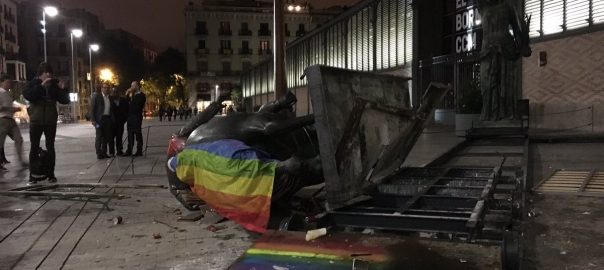26.10.2016 - 18:16
|
Actualització: 26.10.2016 - 20:16
Last night, shortly after one in the morning, Barcelona’s Plaça del Born was once again unblemished, after city workers hauled away what remained of the Franco statue that several youths had toppled to the ground. Minutes later, the governing coalition formed by Barcelona en Comú and the Socialist Party announced that the statue would not be installed again in a public space.
Many residents, those who saw it as a provocation and failed to understand City Hall’s stubborn defence of it, celebrated the images of the dictator’s statue, covered in paint and adhesives, falling to the ground. Just as soon as its presence was announced, most of us recognized it as a provocation that could not be sustained for long.
[Watch the videos of the statue’s toppling and removal]
Ada Colau’s administration had wanted the Franco statue to remain on display at the entrance to the old Born market until January, but those plans were derailed. Because, after making the political gaffe of installing the statue in the first place—a faux pas that is likely to mar the legislative term—, it could not possibly commit a worse offence than to go out of its way to protect the dictator. The image of the Barcelona en Comú-PSC coalition defending Franco against public outcry was simply untenable. And if the local authorities proved unable to guard the statue, its fate was already foretold: it could come one night or another, but everyone knew what would happen in the end.
The entire operation has been a monumental blunder from start to finish, shining a spotlight on the shortcomings of Barcelona’s local government. These include its inability to reach agreements, as evidenced only the day before yesterday, even more egregiously, during the Municipal Action Program negotiations. And the autocratic stance of some of its members, who have no qualms about defying logic, common sense, and public opinion, convinced as they are of the superiority of their ideas. And the blatant improvisation that is all-too common. And the habit of resorting to headlines and sensationalism for political purposes (such as when it announced, to great fanfare, the closure of the local immigrant detention centre, which not only has remained open, but is getting more crowded by the day). Not to mention the perverse obsession among some local government factions (a small but influential group) with anything resembling a symbol of Catalan nationalism.
The only reason to place an image of Franco by the entrance to the Born market was to provoke and punish the Catalan nationalists, in a smear campaign of sorts, with the more cavalier members of En Comú Podem already describing it as the “Valley of the Fallen of Catalan nationalism”, in reference to monument that is a symbol of Fracoism at the outskirts of Madrid.
We were told we must see the exhibit in order to understand the context. However, after having seen it, it amounts to so little, it seems so inconsequential and measly, that the presence of the statues at the entrance becomes even more incomprehensible. The viewer is left with the distinct impression that the statues are the whole point, and that the exhibition itself was only a rather pathetic excuse to have them installed.
But the local government refused to listen, made no attempt to grasp the difference between displaying a statue such as this inside a museum and displaying it on public property; it refused to acknowledge the pain its public display caused some people; and it proved unwilling to accept the advice of moderates who warned that this was bound to end badly and that persisting in the statue’s defence was unwise. The outcome, only four days later, speaks for itself.
Yet there is no need to get excited or magnify the events. After all, Franco died in bed, and Francoism lives on, whitewashed by the Bourbon monarchy. In this respect, what took place last night amounts to little more than an exorcism of sorts, a powerful performance which we will not soon forget, but which leaves us with a bittersweet aftertaste.
Because the sad picture of the exhibit’s opening day, with all the public infighting among anti-Francoists, is just painful. As is the incoherence of those who want Franco removed from El Born market but not from the streets of Tortosa. As is seeing those responsible for this blunder being blinded by their own hatred.
That said, I do agree that watching the public’s reaction was a great pleasure. It dignified Barcelona.


